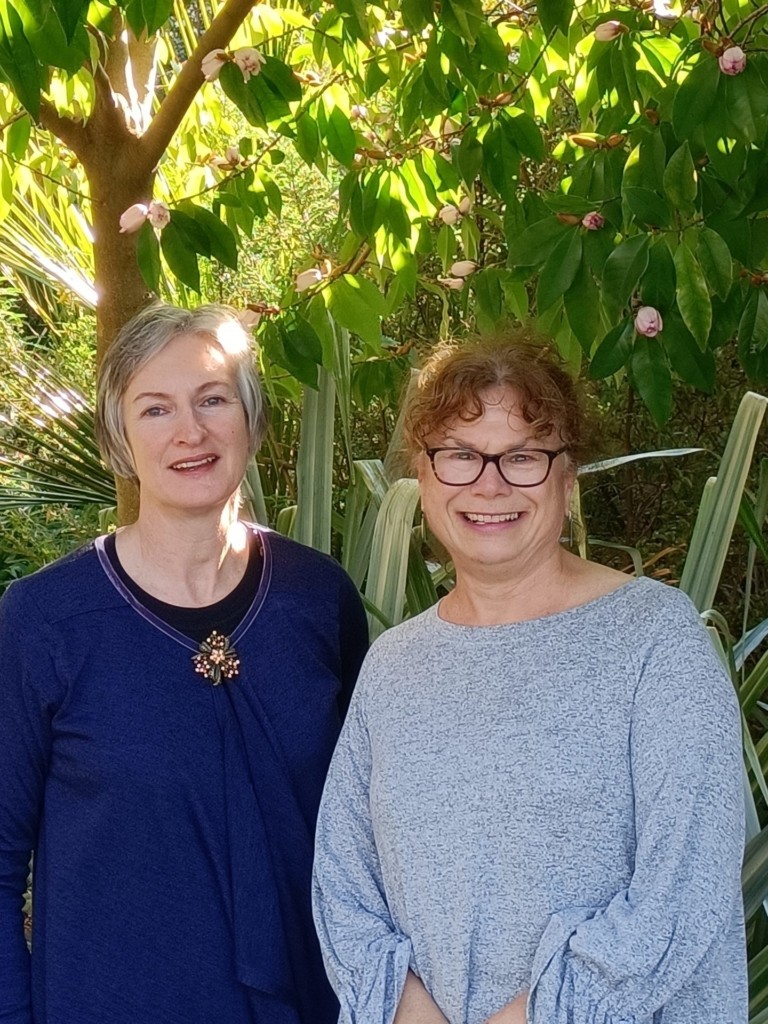
EIT’s “Learning in Nature” Education Facilitators Robyn McCool and Megan McBride at the Ōtātara Outdoor Learning Centre (OOLC) on the Hawke’s Bay Campus in Taradale.
EIT has added two experienced environmental educators to the team leading its sustainability strategy connecting local communities.
Megan McBride and Robyn McCool, who were previously employed by Department of Conservation (DOC) to work on Predator Free Hawke’s Bay (PFHB) education projects, have transferred their knowledge, skills and contacts to EIT.
The two, who have been employed as Learning in Nature Education Facilitators within EIT’s Environment and Sustainability Team, will work alongside EIT staff and external schools to support and grow learning in nature initiatives across the region, the school curriculum and a range of EIT programmes. Their appointments are a collaboration between Predator Free Hawke’s Bay and EIT. PFHB is a collaboration between DOC, Hawke’s Bay Regional Council (HBRC), Manaaki Whenua, Maungaharuru Tangitū Trust with funding support from PF2050 Ltd and builds on the work in Poutiri Ao ō Tāne and Cape to City.
Professor Natalie Waran, EIT’s Executive Dean and Professor (One Welfare), who oversees the institute’s sustainability strategy, says the appointments will extend the reach of the wider Learning in Nature project. They will also enhance the work undertaken through the Ōtātara Outdoor Learning Centre (OOLC) on the Hawke’s Bay Campus in Taradale.
“Megan and Robyn have been inspiring our tamariki and rangatahi to engage with nature for several years and have hosted numerous workshops for educators and learners across the region including at the OOLC. They already work closely with schools throughout the region and have been working alongside the School of Education to support skills and confidence building for our Candidate Teachers to use the environment as a context for learning throughout the curriculum.”
Megan, who has a background as a primary school teacher – most recently at Te Mata Primary in Havelock North – says the move from ecological restoration projects to EIT was a natural progression.
“We have the same philosophy, which is using nature as a context for learning. And it does not matter what age you are targeting, because learning is lifelong. Nature doesn’t have any age restrictions.”
Megan says the aim is to encourage and support teachers from early childhood right through to high school and beyond to incorporate environmental education in their learning programmes.
“Robyn and I have worked with the Bachelor of Teaching Primary and Bachelor of Teaching Early Childhood, supporting teachers in training since 2015. We will continue that work at the Ōtātara Outdoor Learning Centre, as well as inviting schools to come and experience what we have here.”
Robyn, who worked for DOC for about ten years, has also been a teacher and a farmer. For her, the role is one of linking people together.
“I think a big part of our role has always been and will continue to be networking. We want to make it really easy for people to teach outdoors and to teach with nature as a context for learning and integrate it throughout course curricula, not only here at EIT, but also in the schools.”
“It’s really important for us to come to the realisation that we’re actually part of nature. We’re not separated from nature. And when you look at it in the sense of Te Ao Māori and Mātauranga Māori, that’s very evident through the whakapapa. I think perhaps in the Western paradigm that tends to get left behind a little bit in some conversations, but anybody who regularly gets outdoors knows that.”
For more details about the Ōtātara Outdoor Learning Centre (OOLC), visit the EIT website.
